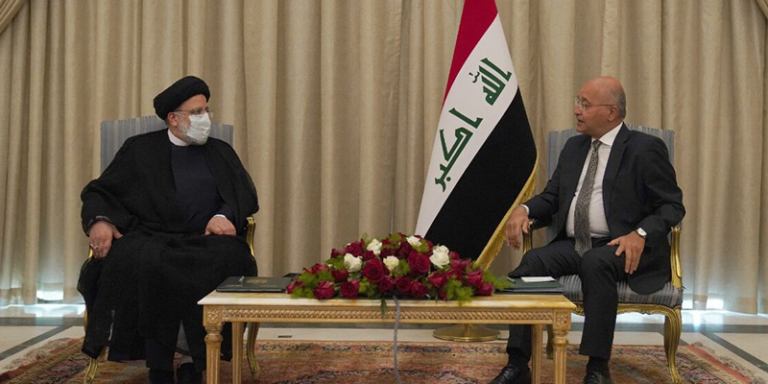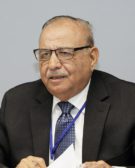
All political developments in Iran have serious repercussions in Iraq, and the election of Ibrahim Raisi as president of the Islamic Republic is no different. As a supporter of the hard-line Supreme Leader Ayatollah Ali Khamenei, Raisi is expected to follow the same policy prescriptions of Iranian policy in the neighboring country during his term in office, one that could very well be extended in 2025. The new president is also said to be groomed by the religious establishment to replace Khamenei as the highest authority in the land, after the current leader passes from the scene.
With Raisi as president, and if he eventually inherits Khamenei’s position and role, Iraq is expected to remain in Iran’s orbit for a very long time to come. Iran-friendly militias and politicians will continue to hold sway over political, security, and economic institutions in the country. And in the absence of Iranian moderates from decision-making circles in Tehran, it is likely that both the sway of such militias and politicians and the resultant Iranian influence in Baghdad will increase exponentially.
Following the Iranian election, there is likely to be a significant public split in Iraq about Raisi. Those known for their loyalty and allegiance to the Iranian doctrine of wilayat al-faqih (jurisprudential custodianship) will show their support and enthusiasm for Raisi. Others not vested in the ideology, such as those loyal to Iraq’s Ayatollah Ali Sistani, will not be enthused. Their position is influenced by developments a few weeks ago when pro-Iran militias pressured Iraqi Prime Minister Mustafa al-Kadhimi to release General Qasim Muslih, who was arrested on charges of killing protesters. Needless to say, Iraq’s Sunnis and Kurds are not happy with Raisi’s victory and find themselves in an undeclared alliance with pro-Sistani militias.
In this atmosphere, there are three distinct scenarios as to how Iraq may deal with Raisi’s election in the coming period.
The first scenario. Everything in Iraq indicates that Iran is about to increase its influence. Iran’s supporters in Iraq have the upper hand in the country’s security and political institutions. The Popular Mobilization Forces (PMF) provide Iran’s supporters with the strike force needed to keep control of day-to-day security and political affairs in preparation for the upcoming October parliamentary elections. The Shia political parties are reflections of the militias in the parliament and the government, and they command the fighting militias as well. To show its control over Kadhimi’s government, on June 26 the PMF held a military parade in Baghdad to illustrate its power and will. Kadhimi presided over the parade to reinforce the PMF’s legitimacy, although it appears that he had opposed the idea of the parade only a couple of days before.
The second scenario. A weaker possibility is that pro-Sistani militias will try to limit Iran’s influence in Iraq. They have power and they can show up wherever Sistani pleases. Their support of Shia control over the country is unquestionable, but they do not support the Iran-backed militias and intervention in Iraq since it weakens the ayatollah and his adherents. Both the Arab Sunnis and Kurds support this faction since it is less aggressive and looks like a supporter of Iraq’s independence.
The third scenario. This scenario focuses on Iraqis who look for change and want to pull Iraq out of the Iranian influence circle. The expectation is that they will organize and participate in the upcoming elections. Hypothetically they may succeed since a vast majority of the Iraqi population supports change in the political system, including the Shia. The Shia dissident movement is concentrated in certain highly populated Shia governorates and has expressed its rejection of Iran’s influence for two years now, having set fire to parts of the Iranian consulates in Basra and Karbala, the Shia Holy City. This movement was strong enough to force the resignation of previous Prime Minister Adel Abdul-Mahdi and helped Kadhimi’s ascension to the premiership. Sistani’s establishment seems to support this movement, but now, after the Raisi election, the Iranian militias will not allow the dissident youth movement to flourish.
Iraq’s Arab neighbors strongly support this third scenario, as does the United States. The Arab trilateral summit between Iraq, Jordan, and Egypt met in Baghdad on June 27 and seemed to push for an alternative to Iranian involvement and influence in Iraq. Strengthening bilateral and multilateral relations between Iraq and Arab countries could provide the necessary alternative to Iran because it could establish new spaces and options for cooperation.
To conclude, Raisi’s victory in the Iranian election complicated the Iraqi political and security situation. It is expected that the upcoming parliamentary elections will be problematic and difficult for the anti-Iran camp in Iraq. If things do not change there, the outcome of the election will likely result in more influence for Iran and its friendly militias in Iraq. Without an international and regional—especially Arab—effort to secure the transparency and integrity of the coming elections, there will be little hope for change in Iraq.

